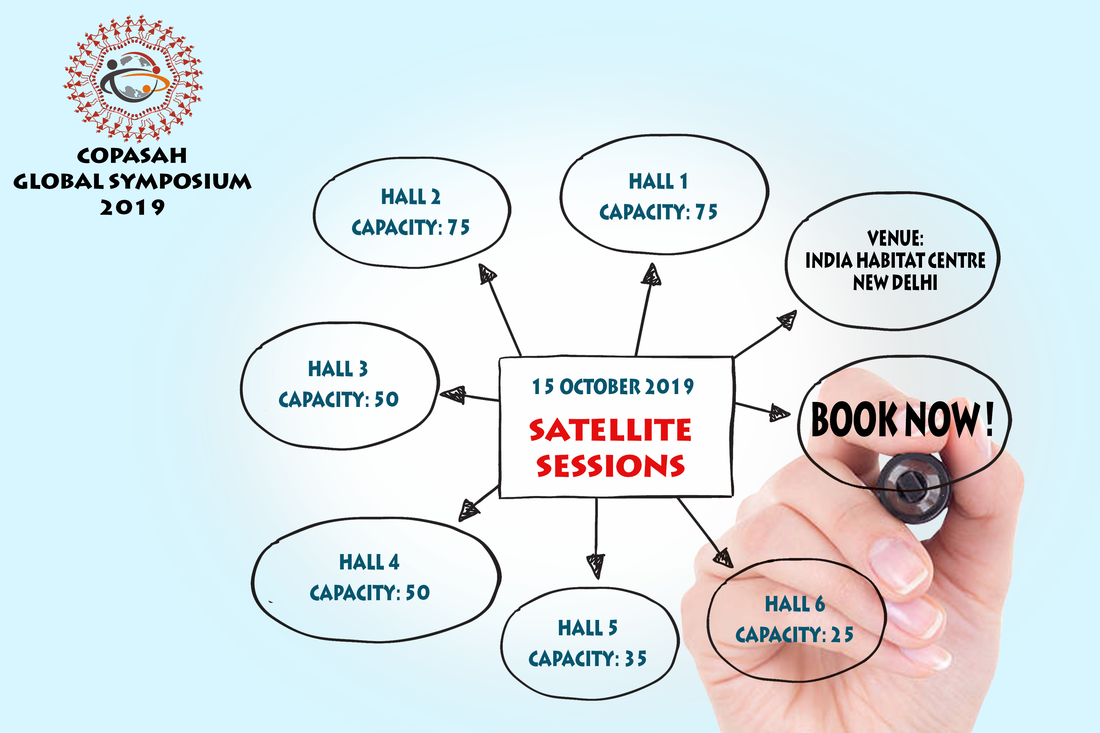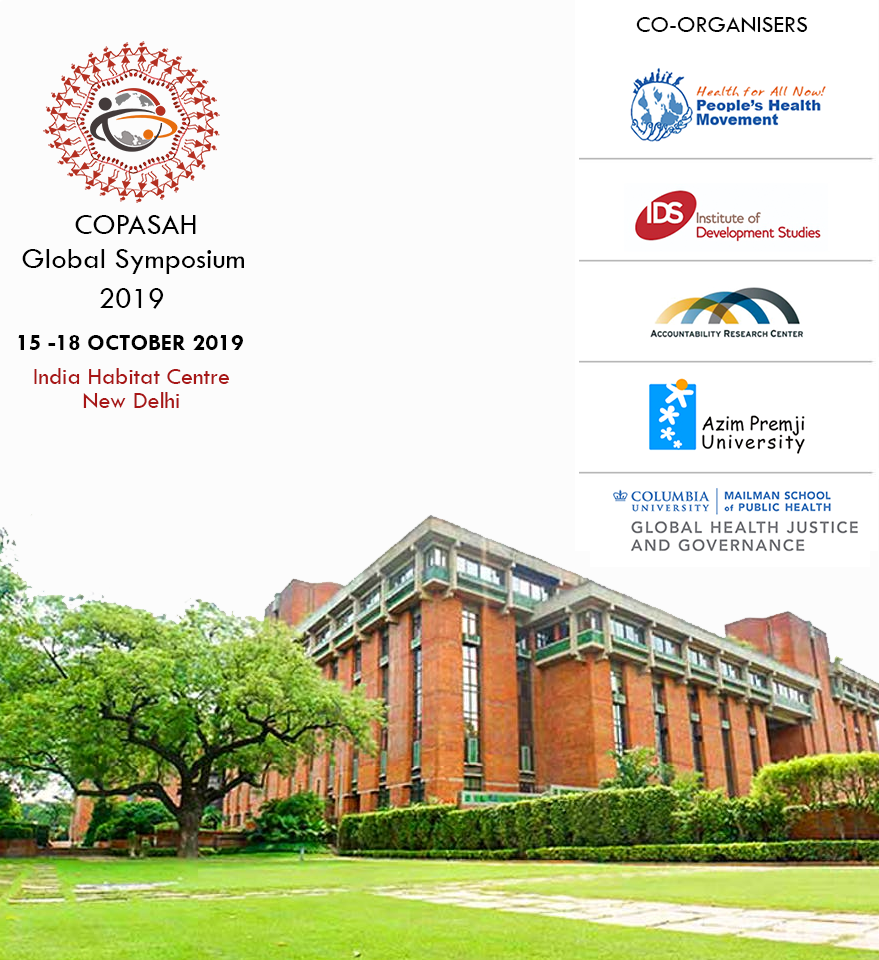
|
|
COPASAH Global Symposium 2019
-: Citizenship, Governance and Accountability in Health :-
15-18 October 2019, New Delhi, India
-: Citizenship, Governance and Accountability in Health :-
15-18 October 2019, New Delhi, India
Leaving No One Behind : Strengthening Centred Health Systems for Achieving Sustainable Development Goals
|
CONTEXT
The Alma Ata Declaration in 1978 with its call for ‘Health for All by 2000’ marked a new shared aspiration for all citizens to re-imagine the possibilities of reaching the ‘highest attainable standard of health’, articulated in the Universal Declaration of Human Rights (UDHR), as an achievable goal. A value framework of universality and equity with community as the central reference point were integrated both in positioning health as a human right along with proposing comprehensive primary health care as the pathway, as well as centre-staging community participation as one of the core principles. Notwithstanding these lofty ideals of universality and equity, four decades hence the Alma Ata Declaration, the communities in the global south increasingly feel alienated and left behind from the goal of reaching health for all due to the policy processes and pathways pursued. |
The health systems in developing nations include the public health systems as well as a whole array of private health care providers. The public health systems, which are constitutionally mandated to protect and promote wellbeing of communities are increasingly rendered fragile, weak, fragmented and shrunk. Alongside, the burgeoning private health care system has set itself progressively on the path of commercialization and corporatization, resisting its accountability neither to the constitutional principles nor to patients. Such processes of privatization under the neo-liberal economic framework have adversely affected not only patients and citizens, but also health care workers and their relationship with the disadvantaged communities. In addition, the increasingly blurred boundaries between the public and the private as seen in public-private hybrid arrangements have significant implications for the practice and discourses on accountability. The vision of comprehensive primary health care for all has been heavily compromised through the elitist, techno-centric, fragmented and reductionist solutions leading to high levels of inequality in health outcomes, rather than pursing a path of inclusive, community-centred and bottom-up policy processes and pathways.
Consequently, the accountability to the health and wellbeing of citizens and communities has suffered a setback due to State’s evasion of responsibility and the overpowering yet unaccountable presence of the non-state actors in health and health care policy and provisioning. The global and national actors from both the health and non-health sector actors who are operating in this field have contributed to making accountability chains more complex. Such accountability deficits and complexities are created in the upstream and global alignments of private and non-state actors that wield undue influence on global health governance.
In addition, the accountability discourse itself is fret with its own challenges and limitations. The discourses of accountability have been delinked from the policy contexts and the experiences of the community. Some of the predominant approaches are overwhelmingly expert led and instrumental and narrow in their outlook as a tool (ticking a box) or a digital drive for accountability with an overemphasis on efficiency and outcomes simultaneously undermining transformative potential perspectives of equity. It also undermines the centrality of community and the understanding of the power imbalances that the overarching policy processes create. Such limited, instrumental and reductionist accountability perspectives have further exacerbated the alienation of communities and tend to absolve global actors of their influence on the continuing indignities and violations of rights that the communities are confronted with.
Health, well being and dignity for all and community’s claim for human right to health is at the core of COPASAH’s positioning of social accountability. It is driven by the belief in and engagement with the transformative potential of community’s power in demanding accountability from the state and non-state actors and for realizing such a right. Such understanding of accountability is a process of changing power equations of communities with various actors and national-global policy processes, most importantly the state which is vested with the constitutional obligation to ensure condition for communities be healthy. Realizing that such a process of social accountability is only possible in a strong bond of community to global solidarity, the community of practitioners of COPASAH encompasses various actors ranging from people-oriented community leaders, organic intellectuals and institutions committed to such an equitable vision of society.
Consequently, the accountability to the health and wellbeing of citizens and communities has suffered a setback due to State’s evasion of responsibility and the overpowering yet unaccountable presence of the non-state actors in health and health care policy and provisioning. The global and national actors from both the health and non-health sector actors who are operating in this field have contributed to making accountability chains more complex. Such accountability deficits and complexities are created in the upstream and global alignments of private and non-state actors that wield undue influence on global health governance.
In addition, the accountability discourse itself is fret with its own challenges and limitations. The discourses of accountability have been delinked from the policy contexts and the experiences of the community. Some of the predominant approaches are overwhelmingly expert led and instrumental and narrow in their outlook as a tool (ticking a box) or a digital drive for accountability with an overemphasis on efficiency and outcomes simultaneously undermining transformative potential perspectives of equity. It also undermines the centrality of community and the understanding of the power imbalances that the overarching policy processes create. Such limited, instrumental and reductionist accountability perspectives have further exacerbated the alienation of communities and tend to absolve global actors of their influence on the continuing indignities and violations of rights that the communities are confronted with.
Health, well being and dignity for all and community’s claim for human right to health is at the core of COPASAH’s positioning of social accountability. It is driven by the belief in and engagement with the transformative potential of community’s power in demanding accountability from the state and non-state actors and for realizing such a right. Such understanding of accountability is a process of changing power equations of communities with various actors and national-global policy processes, most importantly the state which is vested with the constitutional obligation to ensure condition for communities be healthy. Realizing that such a process of social accountability is only possible in a strong bond of community to global solidarity, the community of practitioners of COPASAH encompasses various actors ranging from people-oriented community leaders, organic intellectuals and institutions committed to such an equitable vision of society.
|
INDIA HABITAT CENTRE, NEW DELHI
|
COPASAH acknowledges several civil society solidarity efforts such as People’s Health Movement, World Social Forum and the global policy level efforts in the discourses around Universal Health Coverage, Universal Access to Health Care, Social Determinants of Health and Sustainable Development Goals (SDGs). Such discourses, intersecting closely with the understanding of universality and intersectionality of marginalization, provide opportunity to review the functioning of health systems and to strengthen community’s role in building people oriented, equitable and accountable health systems in the pursuit of challenging inequitable power structures of society.
COPASAH (Community of Practitioners for Accountability and Social Action in health) was started in 2012 by a group of practitioners, who had been using Social Accountability approaches to strengthen the linkage between communities and the health system to provide quality, accountable care. It is essentially a learning network with a focus on marginalized communities where practitioners learn from each other and by distilling lessons from practice and a bottom up process. Today COPASAH has over 450 +members and 900 +listserve members across different regions of the world and COPASAH is working closely with many academics sharing lessons on how to improve elements of participation and increase equity and accountability of health systems. COPASAH members have also been specifically exploring equity and accountability in the context of private health care as well as for indigenous and other excluded communities. |
Building upon the current interest on achieving universal health coverage and the need to include the most marginalized within the ambit of health systems as an active participant, COPASAH is organising a Global Symposium on Citizenship, Governance and Accountability in Health, between 15-18 October,2019 in New –Delhi-India. The practitioner centred COPGS 2019 on Citizenship, Governance and Accountability in Health is designed as meeting point of practice, think-tanks and policy in community centred health systems. Participating in COPGS 2019 will provide a unique opportunity for researchers, policy makers, donors, development and policy experts to interact and dialogue with the 'foot-soldiers' of community-centred accountability practice from around the world.
For more details of the Symposium see: http://www.copasahglobalsymposium2019.net/index.html



